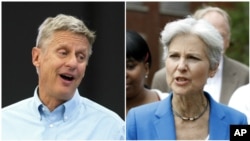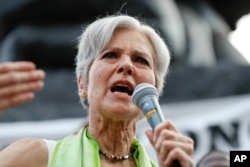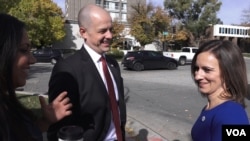At first glance, 2016 appeared to be the year that third-party presidential candidates such as Libertarian Gary Johnson and the Green Party's Jill Stein could finally break through and win a substantial portion of the U.S. electorate.
Both major-party presidential nominees, Republican Donald Trump and Democrat Hillary Clinton, are among the least popular presidential candidates in U.S. history. It only makes sense that voters, especially during an election marked by a wave of anti-establishment sentiment, would be looking for another choice, right?
Well, apparently not.
As the 2016 election winds down, Johnson and Stein find themselves once again limping to the finish line, attracting minuscule levels of support.
According to the latest national polling average by RealClearPolitics, Johnson is capturing just 4.1 percent of the vote. Stein comes in at just above 2 percent.
(Even those figures may be too optimistic. Both candidates attracted similar levels of support in opinion polls issued during the final days of their unsuccessful 2012 presidential runs. But on election day, voters abandoned them, with Johnson receiving only 0.99 percent of the popular vote and Stein getting just 0.36 percent.)
So what happened? Why haven't the third-party candidates been able to take advantage of the seemingly golden opportunity to become legitimate alternatives to Trump and Clinton in the minds of voters?
Strong start
The campaign actually started well enough for both candidates.
Johnson, a fiscally conservative but socially progressive ex-governor of New Mexico, was able to strengthen his ticket early on by convincing William Weld, the two-term former governor of Massachusetts, to become his running mate.
But Johnson failed to gain much traction in the polls, and his support faded further in September after a series of blunders called into question his basic knowledge of foreign affairs.
Asked on MSNBC what he would do about the crisis in the war-torn city of Aleppo, Syria, Johnson responded: "What is Aleppo?" The answer was the subject of widespread criticism on social media.
A few weeks later on the same TV network, Johnson was unable to come up with the name of a single international leader that he respected. "I guess I'm having an Aleppo moment," he said, poking fun at himself.
Things also looked promising for the left-leaning Stein, especially after the primary election success of Democratic socialist candidate Bernie Sanders suggested an appetite among U.S. voters for left-wing policies.
But Stein, a retired physician and longtime leftist activist, proved largely unable to harness the energy of Sanders' liberal movement. She was also dealt a major defeat after Sanders endorsed Clinton following his eventual defeat in the primaries.
In addition, both independent candidates failed to meet the 15 percent polling threshold needed to appear in the three nationally televised presidential debates, missing out on a key opportunity to improve their low levels of name recognition.
Other systematic restraints were also barriers, including state laws that make it difficult for third party or independent candidates' names to appear on voting ballots. Both candidates also suffered from inadequate funding and the widespread perception that voters are "wasting" a vote on a candidate that won't win anyway.
McMullin a factor
The only minor candidate in a position to make any difference in the election appears to be the one who entered the race at the very end: independent candidate Evan McMullin.
Though he doesn't show up in many national polls, McMullin could pull off an upset win in his home state of Utah, where Trump is unpopular with many conservative voters.
If he can win Utah, McMullin, a small government conservative, would become the first non-major party candidate since former Alabama governor George Wallace in 1968 to win electoral votes.







